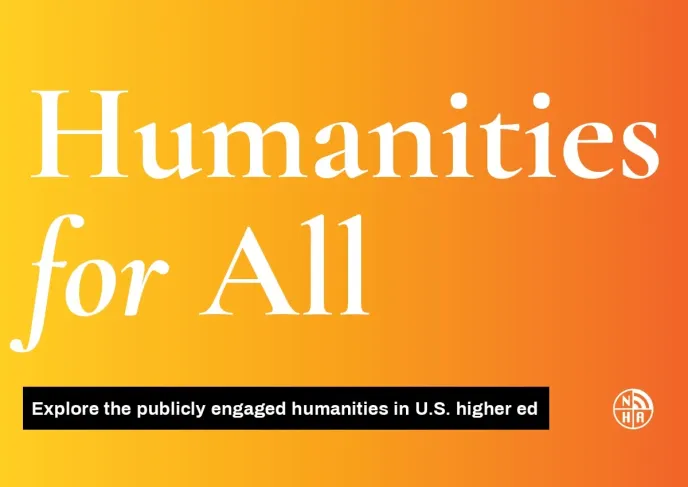Highlighting New Projects on Humanities for All: Fall 2021

We are pleased to announce the addition of new projects to the Humanities for All database. This season, we are highlighting projects that utilize the digital humanities to connect with a wide public. With an eye toward accessible design, preservation, and community interaction, digital humanities scholarship can be an occasion to think about publics in both discrete and global ways. The expansion of digital collaboration during the COVID-19 pandemic and the growing capacity of many digital humanities training programs and initiatives across higher education have helped foster creative approaches to expanding educational access and disseminating large collections of primary and secondary source materials. Below, we highlight a few compelling public humanities initiatives we have added to the database that utilize digital humanities methods and encourage you to explore the initiatives’ websites. You can access the full list of newly-added projects via the panel to the right.
The Regional Initiative for Collecting Histories and Engaging Stories initiative (RICHES) is an interdisciplinary digital project at the University of Central Florida that partners with multiple academic units across campus, six other Florida universities, and commercial and nonprofit sectors of the community. Since 2011, the project has had two goals: 1) to serve as a model for documenting regional histories through an interactive database that draws from multiple repositories and personal collections and 2) to develop new digital tools for historians. To source materials, the RICHES team has hosted “History Harvests” in the region, and has used undergraduate courses as partners in gathering oral histories and collecting and scanning objects. Their most recent digital project, Bending Towards Justice, is an online exhibition that explores the Ocoee Massacre as a local case study of the national effort to suppress the Black American vote. The project began at the request of the Black community of Ocoee, Florida, who during the centennial year of the massacre in 2020 sought ways of commemorating and drawing connections to the present.
Others have redesigned websites with a particular eye to deepening user’s engagement with humanities sources. At the University of Richmond, the New American History project is an initiative of the Digital Scholarship Lab through the University’s Boatwright Library. Led by Ed Ayers and Annie Evans, the digital public history project is an online platform that engages users in new readings of American history through interactive maps, video, audio, an algorithmic engine of journalism, and tools for K-16 educators. Interestingly, the site allows users to browse previous versions of the site’s homepage, to make transparent how the project’s narrative has been shaped over time.
We have also included projects that expand access to archival materials, including those that were disaggregated or dispersed previously. Visualizing the Red Summer is a digital archive and mapping project exploring the events of the the “Red Summer” of 1919, where a series of roughly four dozen (known) white supremacist acts of terrorism and racial riots took place in more than three dozen cities across the United States. Created in 2015 by Karen Sieber, a public historian and digital humanist, the site was built using DH Press, a digital humanities tool-kit and WordPress plugin designed by the Digital Innovation Lab at University of North Carolina, Chapel Hill. Sieber created the website because “while material existed, much of it was split up across the country into smaller collections, not digitized, or inaccessible behind paywalls. I wanted to create a central location to enable further research on the riots.” Resulting from this work, the Visualizing the Red Summer site is now used in classrooms as a teaching aid and has been a featured resource for National History Day, the National Archives, the American Historical Association, National Council on Public History, and others.
Finally, at Northeastern University, the Pandemic Teaching Initiative is a library of educational modules collected from a range of units and disciplines on campus exploring the impacts of the COVID-19 pandemic. The open-access library of lessons spearheaded by Lori Lefkovitz and Ron Sandler contains lectures by Northeastern professors, readings, videos, suggested assignments (for those interested in classroom use), and additional resources for those who want to learn more about the module’s topic. Learning modules include timely topics such as “The Tiger King, the GOAT, and the Celebrity Next Door: Viral Viewing as Panic Mediation,” “Religion in a Time of Corona,” and “Balancing Liberty and Public Health: Civil Liberties in a Time of Pandemic.”
Check out the new projects on the right, and help us build our database by submitting new listings.